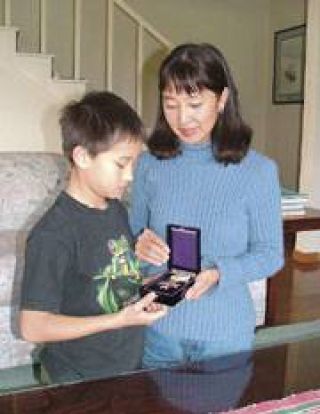By Dennis Box, The Courier-Herald
On Feb. 26 a man died, quietly, much as he lived. George Koshi was 92.
His daughter, Sharon Hanek of Bonney Lake, smiles warmly when she talks of her father. She tells the story of his life with a sense of pride. It is the story of the quiet life of an American hero.
It was in Colorado, in 1911, when Koshi was born. He would be the third of 10 children born into a Japanese-American family.
When he was 6, Koshi and the oldest six siblings were sent to Japan. That was a tradition of that time, but it took his father 10 years to save the money to bring his son back to America.
When Koshi left Colorado he spoke only English, but when he returned at the age of 16 he wore a kimono and spoke only Japanese. It gave him the opportunity for a truly remarkable life.
The young Koshi went to law school at the University of Denver, and it wouldn't be long before the world would radically change.
On the morning of Dec. 7, 1941, the Japanese military attacked U.S. forces at Pearl Harbor. The United States quickly entered World War II and Koshi was about to begin a journey that would eventually make him - in a very quiet, humble way - a founding light in the post-war world of Japan.
During the war, many Japanese were sent to internment camps. Because of Koshi's bilingual skills and legal mind, he was able to join the U.S. Army in 1942. He was sent to the Military Intelligence School in Minnesota known as Camp Savage.
He was initially a student there, and eventually became an instructor. He also researched and analyzed intelligence gathered in the South Pacific.
In 1943 Koshi was sent to the Pentagon to analyze captured documents on Japanese troop movements and strategy. He became an intricate, behind-the-scenes piece of the American war puzzle which finally brought victory to the Allies.
His work during the war was exceptional, but the mark he would leave on the world was just beginning to be formed.
After the Japanese surrendered on the deck of the U.S.S. Missouri on Sept. 2, 1945, Koshi was sent to Japan to act as a defense attorney for the War Crimes Trials in Yokohama. He defended those accused of Class B crimes, a criminal act by a soldier against another soldier.
The new age of Japan began on May 3, 1947 when the Constitution of Japan was enacted. It was based on the U.S. Constitution and written by Gen. Douglas MacArthur and his staff.
The job of teaching democracy to the Japanese fell to Koshi. He taught them how to use the Constitution, how to write and implement laws, and how to build a democratic society.
MacArthur insisted on approving all laws written by the new Japanese legislature, but he couldn't read Japanese. Koshi worked as a liaison between MacArthur and the Japanese to give birth to the new democracy. To this day he is still known in Japan as the midwife of the Japanese Constitution.
Koshi stayed in Japan for 30 years after the war. In 1974 it was time to return to the only country he ever called home.
The Japanese government marked his leaving by giving him the Emperor Award of the Third Honor.
He lived out the rest of his years enjoying his children and grandchildren with his wife Ai. Koshi and Ai met on a rainy day in Washington D.C., when he worked at the Pentagon.
His words to his daughter on how democracy took hold in Japan are acutely relevant in today's world.
"They had a concept of honor and deity," Koshi said. "If they have that, democracy will work."
Dennis Box can be reached at dbox@courierherald.com


